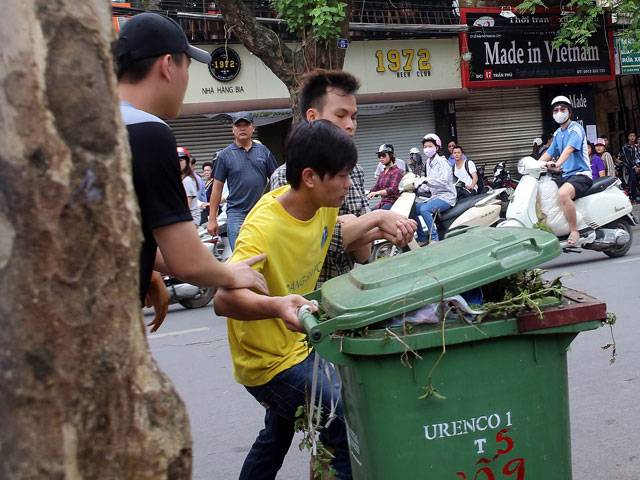HANOI : Vietnamese security forces stifled fresh protests Sunday over China’s plans to drill for oil in contested waters, as Beijing sent five ships to help evacuate its nationals from Vietnam following deadly mass riots last week.
China’s state media said more than 3,000 of its citizens had already returned home in recent days after the territorial tensions and riots sent relations between the frequently quarrelsome communist neighbours spiralling to their lowest point in decades.
Enraged mobs torched or otherwise damaged hundreds of foreign-owned businesses last week, killing two Chinese nationals and injuring about 140.
While China’s deployment of the giant rig is seen in Vietnam as a grave provocation, the ferocious public reaction appeared to catch authorities by surprise.
Fearing an impact on vital foreign investment, Vietnamese authorities took no chances Sunday as activist groups tried to stage further demonstrations, though they insisted they would be peaceful.
Hundreds of security personnel swarmed over streets leading to the sprawling Chinese embassy in Hanoi, restricting access to the neighbourhood and other suspected protest sites.
Blogs by civil society groups involved in the protest call said activists were detained in several areas around the country or prevented from leaving their homes.
China’s Xinhua news agency said the Chinese nationals brought home included 135 people hurt in the unrest last Tuesday and Wednesday including 16 who were “critically injured”.
China also said it was dispatching five ships to bring home even more of its nationals and would suspend some bilateral exchanges with its southern neighbour.
The recent violence was “damaging the atmosphere and conditions for exchanges and cooperation”, a foreign ministry statement said. “The Chinese side as of today... suspended part of its bilateral exchange plans,” it said, without giving specifics of the plans. “China will see how the situation develops and look into taking further steps.”
China had earlier warned its citizens against travel to Vietnam following what it called the “explosion of violence” and has urged its nationals still in the country to increase safety precautions.
The oil rig standoff has further poisoned relations between two countries that have fought territorial skirmishes in the past and are increasingly at odds over their South China Sea claims.
Workers demonstrated in 22 of Vietnam’s 63 provinces last week, according to the government, with furious mobs torching foreign-owned factories and enterprises believed to be linked to China or which employed Chinese personnel.
Hundreds of businesses were hit, Vietnam’s government has said.
China is widely accused in Vietnam of bullying behaviour stretching back more than 1,000 years, and Hanoi’s communist government occasionally allows protesters to vent anger.
But the recent outbursts have sent the government scrambling to limit damage to a developing economy dependent on foreign investment.
“We will not allow any acts targeting foreign investors, businesses or individuals, to ensure that the regrettable incidents will not be repeated,” Dang Minh Khoi, assistant to Vietnam’s foreign minister, told reporters Saturday.
“We ask countries to continue to encourage their investors and citizens to rest assured on doing business in Vietnam.”
Vietnamese officials say more than 300 suspected perpetrators were being prosecuted.
Vietnam’s abundant, cheap labour market attracted $21.6 billion in foreign direct investment in 2013, up from $16.3 billion the year earlier, according to government figures.
The recent events could have a long-term impact on its image as a safe place for investment, said Edmund Malesky, an expert on Vietnam’s investment-fuelled development at Duke University.
“The riots have called that safety into question. In the future, foreign investors will have to balance Vietnam’s advantageous labour costs and quality against this potential instability,” he said.
China, which has refused Hanoi’s demands to remove the Haiyang Shiyou 981 rig, has been roundly criticised for deploying it given increasing tensions in the South China Sea, with Washington expressing deep concern over the potential for the row to escalate.
Dozens of Chinese and Vietnamese vessels have engaged in repeated skirmishes near the rig, including reported rammings and the use of water cannon.
The violence in Vietnam has further inflamed the situation, with China accusing Hanoi of a role in the unrest.
The enterprises targeted in the violence included Chinese, Taiwanese, Korean and Singaporean businesses.
It was not clear why non-Chinese businesses were hit, but there is growing resentment in Vietnam over a perceived rise in Chinese workers taking jobs from locals, in addition to reported unhappiness over working conditions with some foreign employers.
China’s Southeast Asian neighbours have voiced growing alarm over Beijing’s increasingly assertive claim to nearly all of the South China Sea, a stance buttressed by a rapid build-up of the Chinese military.
Tuesday, November 26, 2024
Vietnam stifles new protest as China fumes

Caption: Vietnam stifles new protest as China fumes
14 Palestinians killed in Israeli attacks across Gaza
10:13 PM | November 26, 2024
Schools in Islamabad, Rawalpindi remain closed amid ongoing PTI protests
10:10 PM | November 26, 2024
No talks with PTI protesters, government pledges strict measures
9:11 PM | November 26, 2024
Social media neutrality at risk as Trump taps Musk for new federal agency
8:16 PM | November 26, 2024
PTA initiates second trial to block unregistered VPNs ahead of December deadline
8:14 PM | November 26, 2024
-
Gallup survey: 47pc of Pakistanis never used trains
-
Gallup survey: 47pc of Pakistanis never used trains
-
Digital nomadism redefines work and travel across the globe
-
Lahore tops global pollution rankings as smog worsens, AQI reaches hazardous levels
-
Hunger crisis to increase in South Sudan, warns UN
-
Pakistan’s judiciary champions climate justice at COP29 in Baku
Fixing PSDP
November 26, 2024
KP’s Failure
November 26, 2024
Invading Islamabad
November 26, 2024
Economic Imperative
November 25, 2024
Systematic Change
November 25, 2024
Smog War Between India and Pakistan
November 26, 2024
The Exodus of Talent
November 26, 2024
Exotic Food
November 25, 2024
Karachi Language Barrier
November 25, 2024
APSUS Report and Economic Challenges
November 25, 2024
ePaper - Nawaiwaqt
Nawaiwaqt Group | Copyright © 2024





